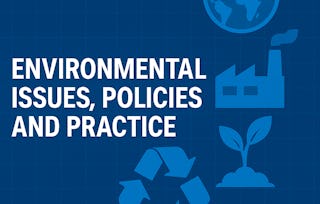Studies of the late twentieth and early twenty-first centuries demonstrated persistent trends in the US: race, income, and other factors predispose marginalized communities to higher toxic waste exposure and poorer quality of air, water, housing, and recreational spaces. In “Environmental Justice,” you’ll learn how these burdens have individual, interpersonal, and intergenerational effects and how environmental justice has helped mitigate these inequities

Environmental Justice

Environmental Justice
This course is part of Green Skills for a Sustainable and Just Future Specialization

Instructor: Rebecca Hardin
Included with
Recommended experience
What you'll learn
Analyze current trends, events, and changes in the field of environmental justice using knowledge of the field’s history
Describe concepts and actions around the four types of justice as they relate to actions, organizations, and technologies
Contextualize environmental justice work in relation to histories of human inequality, adaptation, and resilience
Skills you'll gain
- Community and Social Work
- Case Studies
- Social Justice
- Sustainable Development
- Environmental Issue
- Policy Analysis
- Health Equity
- Community Development
- Climate Change Adaptation
- Collaboration
- Advocacy
- Environmental Laws
- Research
- Environmental Regulations
- Cultural Responsiveness
- Legal Proceedings
- Environmental Policy
- Skills section collapsed. Showing 10 of 17 skills.
Details to know

Add to your LinkedIn profile
5 assignments
See how employees at top companies are mastering in-demand skills

Build your subject-matter expertise
- Learn new concepts from industry experts
- Gain a foundational understanding of a subject or tool
- Develop job-relevant skills with hands-on projects
- Earn a shareable career certificate

There are 6 modules in this course
In this module, we'll talk specifically about how the Environmental Justice movement gained momentum through community responses to the distributive justice problem of inequitable siting of waste facilities in residential areas where nonwhite Americans live. We will discuss the uneven distribution of waste burdens, the "not in my back yard" or NIMBY movements that came together in response to create the wider EJ movement and field of study. We'll scrutinize the socio-environmental implications of waste management, the quest for fairer consumptive and recycling practices, and outline the intricate relationship between activism, research and teaching, policy, and the pursuit of environmental equity.
What's included
8 videos7 readings1 assignment2 discussion prompts
In this module, we will explore the concept of Procedural Justice in the context of EJ, and its institutionalization. Focusing on both Energy Justice Systems, we will discuss decision-making, political contexts and implications for the built environment and human experience. What role does energy access play in achieving Environmental Justice goals? We will have interviews with energy specialists Tony Reames, Deputy Director for Energy Justice at the U.S. Department of Energy and Rahul Agrawal Bejarano, Project Manager and Data Analyst at the Energy Equity Project, to examine cases from their work and assess relevant legislative and policy frameworks. We will also discuss tools for practitioners to incorporate procedural justice principles.
What's included
5 videos6 readings1 assignment
We define Retributive Justice in relation to EJ, and and aspects of Infrastructural and legal Justice in US carceral and criminal systems that punish those committing harm, contrasting them with the practices currently in vigor vis a vis responsibilities and actions of corporations. We scrutinize punitive approaches, costs and environmental impacts of imprisonment, compared with processes of corporate accountability in light of social and environmental injustices. Through critical analysis, we will engage with the ethics and pragmatics of holding individuals and corporations to account.
What's included
4 videos4 readings1 assignment
Conceptualize the principles and practices of Restorative Justice as defined by the United Nations, and others, as they relate socially restorative practices in ever wider use to restoration ecology and its expansion at present. The module will not only consider the expanding use of restorative justice circles and related practices in households, schools, local communities and even entire nation states in post conflict settings, but will also consider the relationship between social justice process and the healing of environmental harms through ecological re-introductions and management.
What's included
4 videos5 readings1 assignment
This module discusses Reparative Justice, widely understood but still limited in practice. It also explores emergent justice frameworks, relying most on the frame of Relational Justice, an emerging term that captures a range of justice approaches that are less transactional or rooted in existing harms and more about harm prevention. We consider these practices in light of histories like slavery and colonial violence that undergird many modern nation states, and relate them to contemporary challenges for attaining climate justice. We review initiatives like the US "Justice 40" push to put funding for climate adaptation into frontline vulnerable communities, and explore their effectiveness in healing harms.
What's included
5 videos9 readings1 assignment
This module wraps up our course with a synthesis of the course and part 2 of the Interview with Paul Mohai. As a founding father of the EJ movement, it's fitting that our course began and is now ending with the Mohai interview.
What's included
2 videos1 reading
Earn a career certificate
Add this credential to your LinkedIn profile, resume, or CV. Share it on social media and in your performance review.
Instructor

Offered by
Explore more from Governance and Society
 Status: Free Trial
Status: Free TrialUniversity of Michigan
 Status: Preview
Status: PreviewDartmouth College
 Status: Preview
Status: PreviewO.P. Jindal Global University
 Status: Free
Status: FreeUtrecht University
Why people choose Coursera for their career

Felipe M.

Jennifer J.

Larry W.

Chaitanya A.

Open new doors with Coursera Plus
Unlimited access to 10,000+ world-class courses, hands-on projects, and job-ready certificate programs - all included in your subscription
Advance your career with an online degree
Earn a degree from world-class universities - 100% online
Join over 3,400 global companies that choose Coursera for Business
Upskill your employees to excel in the digital economy
Frequently asked questions
To access the course materials, assignments and to earn a Certificate, you will need to purchase the Certificate experience when you enroll in a course. You can try a Free Trial instead, or apply for Financial Aid. The course may offer 'Full Course, No Certificate' instead. This option lets you see all course materials, submit required assessments, and get a final grade. This also means that you will not be able to purchase a Certificate experience.
When you enroll in the course, you get access to all of the courses in the Specialization, and you earn a certificate when you complete the work. Your electronic Certificate will be added to your Accomplishments page - from there, you can print your Certificate or add it to your LinkedIn profile.
Yes. In select learning programs, you can apply for financial aid or a scholarship if you can’t afford the enrollment fee. If fin aid or scholarship is available for your learning program selection, you’ll find a link to apply on the description page.
More questions
Financial aid available,

